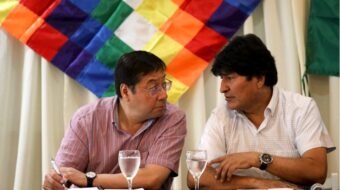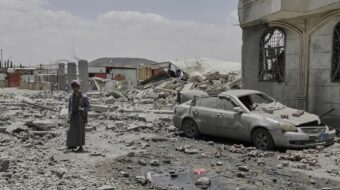Rebel forces broke the cease-fire in the West African nation of Liberia and began bombarding the capital city of Monrovia again this week. Fighting between rebels, many backed by neighboring Cote d’Ivoire and Guinea, and the Liberian army entered the center of the city, marking the greatest threat yet to the government’s hold on power. Hundreds of civilian casualties have been reported as Liberians flee the city and plead for shelter at the U.S. Embassy there.
The Bush administration, which has been under increasing pressure to play a role in an international peacekeeping force in the city, has yet to announce its plans. Additional marines were airlifted into Monrovia in order to protect the U.S. compound, which was hit by mortar fire on July 22. A number of U.S. and international aid workers and diplomats were airlifted out of the country, and a U.S. ship carrying nearly 5,000 marines and sailors has moved closer to the Liberian coast.
Meanwhile, UN Secretary-General Kofi Annan has called for the U.S. to intervene. Bush says he will only act once embattled Liberian President Charles Taylor leaves the country and if a West African peacekeeping force enters the capital. It’s unclear what, if any, role will be played by the Economic Community of West African States (ECOWAS).
Liberia has noteworthy deposits of iron ore, diamonds, and gold. Rubber, timber and coffee are significant exports. Liberia’s neighbors and U.S. corporations are interested in these resources.
For the Bush administration, opportunities to increase its strategic military presence on African soil, particularly under the guise of humanitarian intervention, may be the impetus for its deepening involvement.
Meanwhile civilian casualties mount, as does Liberian frustration with the U.S. Bodies of civilian dead were piled outside of the U.S. Embassy, and someone held a sign saying, “George W., Killer of Liberia.”
The author can be reached at ldellapiana@pww.org









